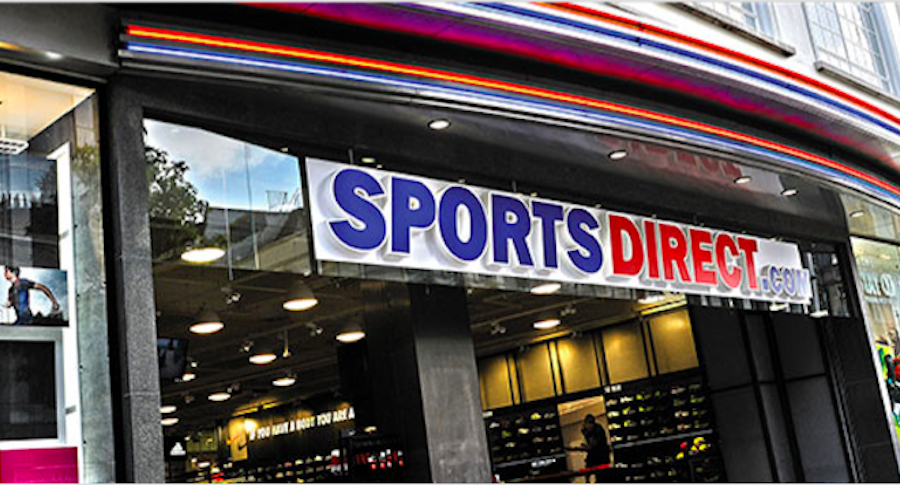Sports Direct reported earnings tumbled 58.7 percent in its year ended April 30. The U.K. sporting goods chain blamed the devaluation of the pound against the U.S. dollar that impacted the prices it pays for goods.
Earnings reached £113.7 million ($148 million), down from £275.2 million. Underlying EBITDA reached £272.7 million ($354 million) versus £381.4 million, a decline of 28.5 percent.
Still, shares in the retailer on Thursday closed up nearly 11.5 percent at 335 pence as the company announced the appointment of a finance director for the first time since 2013 and forecast that earnings for the current year ahead would rise by between 5 percent and 15 percent. Many analysts covering the stock were expecting another decline.
On a conference call with analysts, Mike Ashley, CEO and owner, said the company is now expecting an improved U.K. performance at Sports Direct partly because the company had “smashed the ball out of the park” with its investment in more up-market flagship stores.
“Sports Direct is on course to become the ‘Selfridges’ of sport by migrating to a new generation of stores to showcase the very best products from our third party brand partners,” Ashley said in a statement. “We have invested over £300 million in property over the last year, and I am pleased to report that early indications show that trading in our new flagship stores is exceeding expectations. We will continue to invest and make decisions for the long term, whilst trying to conservatively manage the currency volatility that is reflected in our full year results.”
In its report, Sports Direct noted that as part of the elevation strategy, in Sports Retail, the company has realigned its marketing style toward clean, brand- and category-led campaigns, in contrast to its previous focus on offer-led campaigns.
The report stated, “Our key third-party brand partners are supporting this elevation with greater marketing assets in-store and online, and we have collaborated on the first major co-branded campaigns which were launched in November 2016. These included a premium style of Nike CR7 football boot available in Sports Direct stores, and the adidas Ace 17 football boot. The period also saw the completion of brand showroom suites in Shirebrook which have been developed by Nike, Adidas, Puma and Under Armour.”
Sports Direct had warned in October that its profit would come in below plan after a bet designed to protect itself against a slump in the pound led to a loss of £15 million in the currency markets during an overnight “flash crash” in the value of sterling in the east Asia.
Ashley said the devaluation of Sterling led to a “significant impact” on EBITDA and profits in fiscal year 2017.
“We have put in place hedging arrangements to minimize the short-term impact of currency volatility, but like many U.K. retailers we remain exposed to medium / long term currency fluctuations,” said Ashley. “Our results were also impacted by provisions and depreciation charges. I would like to thank all our people at Sports Direct for ensuring that we continue to move forward together whilst elevating our retail proposition.”
Total revenue increased 11.7 percent to £3.25 billion ($4.2 billion) from £2.9 billion.
In its core U.K. Sports Retail segment, revenues were £2.14 billion against £2 billion, a drop of 6.3 percent. Excluding acquisitions and 53rd week, revenue increased 2.6 percent. U.K. Sports Retail like-for-like stores gross contribution was up 0.3 percent.
International Sports Retail’s sales jumped 38 percent to £665.6 million from £482.3 million. Currency neutral, excluding acquisitions and 53rd week, revenue increased by 5.9 percent. International Sports Retail like-for-like stores gross contribution was down 0.8 percent.
In its Premium Lifestyle segment, sales rose 11.6 percent to £202.2 million from £181.2 million. Results include its premium and lifestyle retail businesses such as USC, Cruise and Flannels.
In its Brands segment, sales were £241.1 million against £231.5, an increase of 4.1 percent. The segment includes Everlast, Lonsdale and Slazenger.
In the latest year, gross margins eroded 320 basis points to 41 percent due to the impact of the negative movement in the U.S. dollar exchange rate against the pound and to an increase in provisioning for stock obsolescence higher risks in a fast changing market and supply chain were identified.
Group operating costs increased by 16.9 percent to £1.06 billion, largely as a result of the impact of increased onerous lease provisions across Europe stemming from a review of poorly performing stores where the U.S. dollar exchange rate has reduced margins.
The company’s report also noted that Sports Direct completed the acquisition of approximately 50 stores under the Bob’s Stores and Eastern Mountain Sports banners, representing its first stores in the U.S. The filing stated, “This acquisition will provide a footprint in US retail and a platform from which to grow U.S. online sales.”
The filing also noted that as of July 19, it had acquired stakes in Debenhams plc, 18.22 percent; Iconix Brand Group, 13.25 percent; and Finish Line Inc., 37.05 percent.
Looking ahead, Ashley said Sports Direct’s “outlook is optimistic” despite the currency headwinds because its next-generation flagships are roundly delivering greater EBITDA than an average Sports Direct store. Ashley nonetheless cautioned, “However, we will continue to be conservative in managing for the medium to long term, which may result in short-term fluctuations in underlying EBITDA, particularly given the continued uncertainty surrounding Brexit.”
Photo courtesy Sports Direct
















